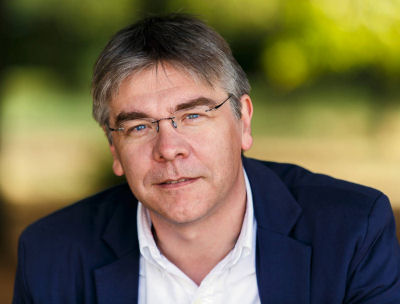Meeting Eric Tanguy

Birth of a vocation
Eric Tanguy was born in 1968 into a musical family. His father, an oncologist, listened to all kinds of music, from Bach to Xenakis. At 5 he got stunned by a disk of Ivry Gitlis playing concertos by Tchaikovsky and Mendelssohn: “I will be a violinist” … He first takes a few piano lessons before tackling the violin to 6 years. Two years later, he already write his first compositions.
At 12, he entered the Conservatory of Caen where he had the opportunity to meet Ivo Malec at a concert. He said to him: “Come and see me at the Conservatory of Paris (Paris Conservatoire) when you’re ready.” His violin teacher, Rodrigue Milosi, at 17, introduced him to the composer of Romanian origin Horatiu Radulescu (1942-2008) with whom he studied for four years, especially the spectral composition technique. He will join in 1988 Ivo Malec (* 1925) at the Paris Conservatoire where he won the 1st Prize of Paris (“curious, and a little sad that this prestigious award has been deleted from the musical studies in France”) and reaches the third cycle. Malec being retired, he will study under Gérard Grisey (1946-1988) for two years. He will be resident at the Academy of France in Rome (1993-1994) after winning the Villa Medicis contest . It was during his stay in Rome he established the foundation for a modal language that he has been developing since.
In 1997, the premiere of his Violin Concerto, which was commissioned by the Orchestre de Paris, provoked an aesthetic misunderstanding with some decision makers in the creation field: “I no longer had any command for some time – the modality was certainly not anymore in line with the complex post-spectralism of my debut. ”
His career took an international rised when Rostropovich commissioned and created his Second Cello Concerto at the Flâneries Musicales de Reims in 2001, then played in Boston and New York under the direction of Seiji Ozawa. Asking him why he was playing his music, Rostropovich replied that he had decided to do it “because I saw in your music things I have not seen elsewhere …”.
Sound Geography
When asked which composers have marked the answer comes without hesitation: Henri Dutilleux (“what a scandal that there was no State representative at his funeral ! “), Pascal Dusapin, Olivier Messiaen. And of course Horatiu Radulescu (“a fascinating music, incredible”), as are spectral musics by Gérard Grisey or Tristan Murail. “Today, I feel very close to the Finnish composers Kaija Saariaho and Magnus Lindberg, whose singularity of color and musical discourse speaks very much to me. I am also very appreciative of the power of inspiration of Wolfgang Rihm“.
In addition, Eric Tanguy greatly appreciates the work of his colleagues Philippe Schoeller, Thierry Escaich, James McMillan, Thomas Ades, Arlene Sierra, Kenneth Hesketh, but also Régis Campo, Gérard Pesson or Mark-Anthony Turnage.
Returning to Dutilleux (“I’ve always been fascinated by the emotion, lyricism and poetry of his music”), I ask him, but then what about Boulez, Stockhausen, Manoury? “The music of Pierre Boulez seems to me more intellectual and technical, though there are at least three periods in his work, which softened over time: compare Dérive 2 to the Marteau sans maître for example. Since ever, one of my favorite works is Kathinkas Gesang by Stockhausen for flute and electronis (made at IRCAM). I have a great admiration for Philippe Manoury. Moreover, Xenakis is among the greatest of my favorite composers.”
Language singularity
“My catalog contains a hundred works. I never forget Horatiu Radulescu’s advice, telling me ‘before judging one of your scores, just wait for 10 years”.
“I write the music I want, freely, even if it is usually after a command: I very rarely have time to compose a work just for me. Some of my scores are very accessible, some less. My language is modal, but has nothing to do with any neo-tonal current. This is a technical mistake of confusing the modality with the tonality. But basically, the only thing that interests me about other creators, is the singularity of language regardless schools or eras. So, my vocation as a composer also owes much to the discovery of the works of Vivaldi and Sibelius I never stopped studying.”
“I am fortunate that my scores are now played a lot and everywhere, including the United States. Esa-Pekka Salonen has choosen to conduct my piece Affettuoso at his concerts with the Los Angeles Philharmonic Orchestra at Walt Disney Hall in February 2016. The country is huge, extremely open and dynamic in its aesthetic diversity”.
News
In September 2015, Eric Tanguy will be a residency composer at the Open Chamber Music of Steven Isserlis.
Again in September, Rising for solo cello, will be created in China at the Beijin International music competition.
In December, will occur in Finlanf the world premiere os his symphonic piece Matka (trip), a command from his residence at the Kone Fondation and the Orchester of Jyväskylä conducted by Ville Matvejeff. In addition, this orchestra, which had proposed a portrait of his music throughout the year 2015, plays in November his Concerto for Cello and Orchestra No. 2.
Among other projects: a Third Violin Concerto pour violon for Renaud Capuçon, a piano concerto for Nicholas Angelich et Daniel Harding, a concerto forpercussions (Finnish-Norwegian commission), and also a clarinet concerto for Pierre Génisson.
Here, his piece Invocation by Benedict Kloeckner :
